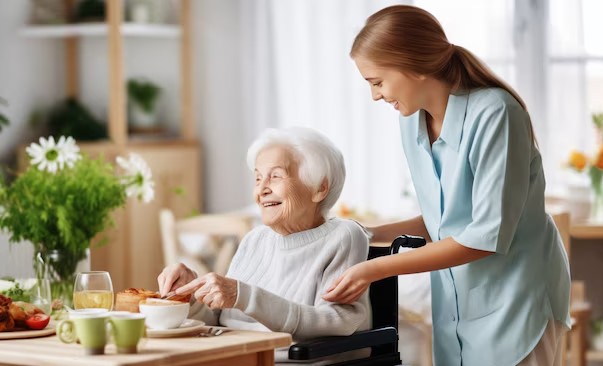Live in Care
We use a team approach to providing health care, and involve the patient as part of our team. Involvement by our staff in the community.

Live in Care
Live-in care is a type of personal care service where a professional caregiver lives with the individual they are caring for, providing round-the-clock support in the comfort of the person’s own home. This type of care is ideal for individuals who need constant assistance but wish to remain at home rather than move to a care facility such as a nursing home or assisted living.
Key Features of Live-In Care:
- 24/7 Support: The caregiver is present in the home for the entire day and night, ensuring continuous care and assistance with daily activities.
- Personalized Care: Live-in care is tailored to the individual’s specific needs, including help with personal care (e.g., bathing, dressing), housekeeping, meal preparation, medication management, mobility assistance, and companionship.
- Familiar Environment: One of the major benefits of live-in care is that the individual can stay in the comfort of their own home, which can provide a sense of security, independence, and emotional comfort.
- Flexible Care: Live-in caregivers can offer a variety of services, including palliative care, dementia care, and support for those with disabilities or chronic health conditions.
Types of Care Provided:
- Personal Care: Assistance with activities of daily living (ADLs), such as bathing, dressing, toileting, and grooming.
- Mobility Assistance: Help with moving around, whether it’s from room to room or support with getting in and out of bed, chairs, or a vehicle.
- Household Support: Light housekeeping tasks like cleaning, laundry, and shopping.
- Meal Preparation: Preparing nutritious meals according to the individual’s dietary preferences or needs.
- Medication Management: Ensuring the individual takes their medications as prescribed, including assistance with reminders or administering medications.
- Companionship: Offering emotional support and social interaction, which can help reduce feelings of loneliness and isolation.
- Specialized Care: Some live-in caregivers may have training in specific types of care, such as dementia care, palliative or end-of-life care, or managing chronic conditions.
Who Benefits from Live-In Care?
- Elderly Individuals: Older adults who need help with day-to-day tasks but want to remain at home, rather than moving to a care facility.
- People with Chronic Illnesses: Those who have conditions like diabetes, heart disease, or other chronic health problems may need ongoing monitoring and assistance.
- People with Disabilities: Individuals with physical or developmental disabilities may benefit from live-in care, as it provides the assistance they need to live as independently as possible.
- People with Dementia or Alzheimer’s: Live-in care is especially beneficial for individuals with memory loss, as caregivers can provide supervision, structure, and safety to help manage the progression of the disease.
- Post-Surgery or Recovery Patients: Individuals recovering from surgery or medical procedures can have a caregiver provide the support they need during recovery, including help with mobility, medication, and activities of daily living.
Benefits of Live-In Care:
- Personalized and Flexible Care: Live-in care offers highly individualized services that can be adjusted based on the person’s evolving needs.
- Comfort and Familiarity: Receiving care at home allows the individual to stay in a familiar environment, which can be less stressful and more comfortable than moving to a care facility.
- Consistent and Reliable Care: With a caregiver present 24/7, there is always someone available to help with needs and emergencies, offering peace of mind to both the individual and their family.
- Prevents Hospitalization: Live-in care can help manage health conditions and prevent unnecessary hospital stays or emergency room visits by providing constant support and early intervention when issues arise.
- Improved Quality of Life: The personal and emotional support offered by a live-in caregiver, along with the ability to remain in a familiar setting, can significantly enhance a person’s overall well-being.
Challenges and Considerations:
- Cost: Live-in care tends to be more expensive than part-time home care or family caregiving due to the 24/7 nature of the service. However, it may still be more affordable than moving to a nursing home or assisted living facility.
- Caregiver Fatigue: Even though live-in caregivers provide constant care, it can be tiring for them. Many live-in caregivers have regular schedules where they work for a set period (usually a week or two) and then switch with another caregiver, allowing for rest.
- Privacy and Space: Having someone live in the home full-time may affect the individual’s privacy and daily routine. It’s important to ensure the arrangement is comfortable for both the caregiver and the person receiving care.
- Choosing the Right Caregiver: It’s crucial to select a caregiver who is not only professionally trained but also has the right personality and communication style to match the individual’s needs and preferences.
Live-In Care vs. Other Care Options:
- Nursing Homes or Residential Care Facilities: In these facilities, individuals live away from home and receive around-the-clock care. While this option may be necessary for people with complex or very advanced needs, live-in care allows individuals to stay at home, preserving their independence and avoiding the institutional setting.
- Home Care (Hourly or Part-Time): Hourly or part-time home care provides assistance for a set number of hours each day, whereas live-in care provides constant, 24/7 support. Home care might be a more cost-effective solution for people who do not need round-the-clock help.
Delivering world class home care
Aim to deliver compassionate, personalized care that empowers individuals to live independently through a focus on compassion, safety, and respect, we strive to build lasting relationships with our clients and their families.

The closest thing to being cared for is to care for someone else.
Carson McCullers
American NovelistOur Services
Emergency? Contact Us


